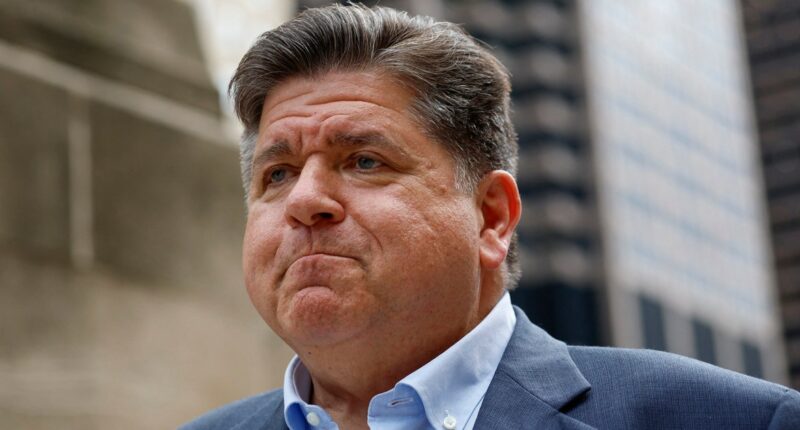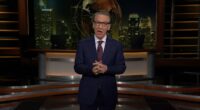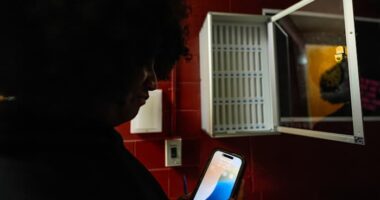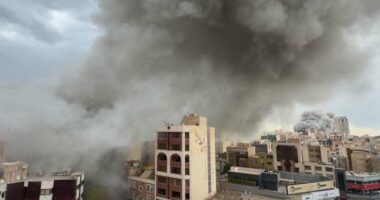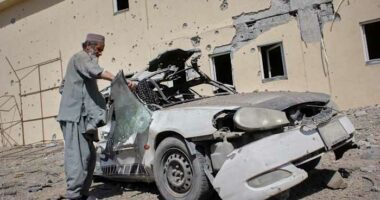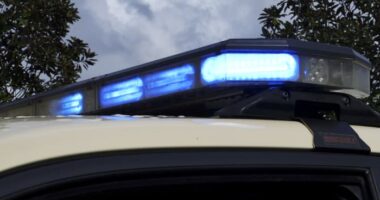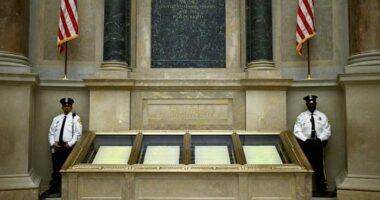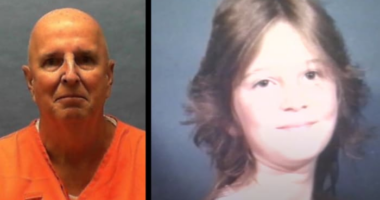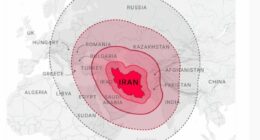Share this @internewscast.com
CHICAGO — Illinois Gov. JB Pritzker set in motion a campaign against federal intervention in his state more than a week ago.
Prior to the arrival of immigration agents in Chicago and the possibility of deploying the National Guard, Governor Pritzker was busy promoting the city on social media and during TV broadcasts. One interview highlighted him strolling along a sunlit path by Lake Michigan, while another showcased him in a Little Village neighborhood restaurant. This week, he also held a press conference in front of the bustling Chicago River, with Trump’s hotel standing out in the background amidst summer tourists.
Pritzker and his team were deliberately curating a visual narrative. Their goal was to fill national media outlets with depictions of everyday life in Chicago, countering President Donald Trump’s claim on his Truth Social platform that it was the “worst and most dangerous city in the World.”
“The president’s ridiculous statements do not align with the reality here. He is clueless about the actual situation,” Pritzker told journalists this week. “There is no crisis necessitating troops. By labeling our city as a hellhole, he is disrespecting Chicago’s residents — and anyone taking his words at face value disrespects us as well.”
Pritzker’s approach is the newest tactic by Democratic leaders from cities like Los Angeles, Washington, D.C., and Baltimore, who have found themselves the focus of a White House that has threatened the dispatch of — or has already dispatched — National Guard forces to their areas.
In response, Pritzker and Chicago Mayor Brandon Johnson have pointed out that the Trump administration reduced public safety funding, canceling substantial grant amounts that affected anti-violence initiatives while simultaneously advocating for increased law enforcement presence. Johnson also criticized states with lenient regulations that contribute to the inflow of guns into Chicago.
Johnson laid out examples of Chicago working with the Bureau of Alcohol, Tobacco, Firearms and Explosives to get guns off the streets.
“I want to know why Trump’s notorious bill cut $468 million from the ATF’s budget. Why did he reduce funding for the agency tasked with removing guns from our streets by almost 30%?” Johnson remarked during a news conference.
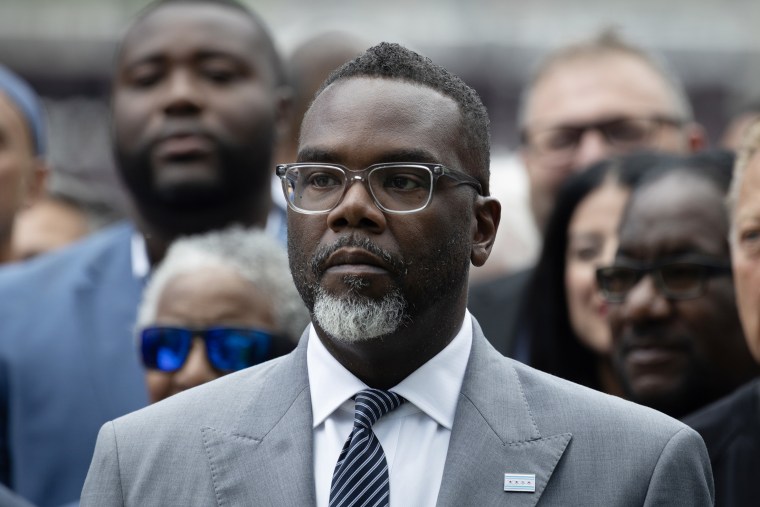
Though crime is down in the cities Trump has targeted, Democrats have been faced with the unpopular prospect of appearing to downplay the issue and rejecting federal assistance. But as the clashes have escalated in recent weeks, Democratic leaders have fine-tuned their messages.
This week, Trump suggested he could send National Guard troops to New Orleans, noting that Louisiana’s Republican governor would be compliant. Some Democrats saw that as a sign that their focus on Trump only targeting blue states was working.
“You do see our governors leading and pushing back with the right approach,” said Josh Marcus-Blank, a Democratic strategist. “None of them are saying crime is fixed.”
In the case of Washington, D.C., Mayor Muriel Bowser — who does not have jurisdiction over the city in the way a governor does over a state — has engaged in a delicate balancing act of collaborating with Trump’s administration while reassuring a disapproving city council that she was not kowtowing to it.
Bowser cooperated with the White House as National Guard troops arrived. She acknowledged that crime dropped after the deployment and noted she and the city “greatly appreciate the surge of officers.”
Her posture at times was viewed as sidling up to the Trump administration, but Bowser clarified in subsequent remarks that she was attempting to find an exit strategy for the National Guard occupation.
“Our North Star is protecting home rule and the district’s autonomy,” she said. “What hasn’t worked, in my opinion, and hasn’t been efficient and is not on mission is National Guard troops, especially from other states.”
D.C. is now challenging the White House’s move in the courts.
Democratic strategist Mike Nellis noted Bowser’s situation stood out from those of other mayors.
“Thanking Donald Trump is like thanking Tony Soprano for protection you never asked for. But she’s in a very precarious position,” Nellis said. “Playing along and keeping her city safe is the smartest move for her — he and the Republican Congress can just slash whatever they want.”
It is unclear what Trump’s next move is, given a court ruling earlier this week calling his deployment of the National Guard and the Marines in Los Angeles illegal.
“We’re going in,” Trump told reporters of Chicago, even after the ruling on Los Angeles.
That legal fight was just one way California Gov. Gavin Newsom has combated Trump’s deployment of federal law enforcement in his city since June.
After launching aggressive immigration raids that drew clashes with the public, Trump declared an emergency, controversially deploying the National Guard and U.S. Marines. Soon, scenes of burning vehicles and looting dominated TV coverage.
“If we didn’t send out the National Guard — Los Angeles would be burning right now!” Trump insisted over Truth Social at the time. The clashes transpired over about five blocks, or 0.01% of Los Angeles County.
Newsom went on his own campaign against Trump, accusing the president of engaging in authoritarianism, challenging him in court, posting photos of National Guard members sleeping on the floor, and ensuring the public knew it was footing the $120 million bill for the deployment.
In one prominent moment, Newsom addressed Californians in a formal speech that was carried live. He laid out how the situation unraveled, citing the immigration raids, the protests that followed and the deployment of the National Guard, whose use of rubber bullets and flash-bang grenades he said only served to escalate it all.
“What’s happening right now is very different than anything we’ve seen before,” Newsom said at the time. “This brazen abuse of power by a sitting president inflamed a combustible situation, putting our people, our officers and the National Guard at risk.”
There were immediate signs of a hunger for the pushback. Social media posts of Newsom’s full nine-minute speech were viewed more than 40 million times in less than a week, according to the governor’s office.
As he braces for what’s next in his state, Pritzker has sought to portray Trump’s impending action as overreach, including the president’s contention that Pritzker should call him and ask for the National Guard to be called to Chicago to deal with violence.
“When did we become a country where it’s OK for a U.S. president to insist on national television that a state should call him to beg for anything? Especially something you don’t want,” Pritzker said this week, referring to a potential National Guard deployment as an “invasion.” “Have we truly lost all sense of sanity in this nation that we treat this as normal?”
For Pritzker, reality has clashed with his strategy. Just after he recorded an interview with CBS News’ “Face the Nation” in Little Village, two people were shot in that heavily Latino neighborhood, one fatally. And over Labor Day weekend, nearly 60 people were shot in the city, again drawing the kinds of violence-laden headlines the governor and Chicago mayor were trying to avoid. Crime is down significantly this year, however. A WBEZ analysis found that this summer, Chicago had the fewest murders since 1965.
“I don’t want to hear another damn word from either one of them that everything’s OK, that we can handle this on our own,” Chicago City Council member Raymond Lopez said of Pritzker and Johnson. “Because what I’m hearing from them is that they have an acceptable loss of life expected from Chicagoans that I do not agree with.”
Brian Hopkins, who heads the Chicago City Council’s public safety panel, said the city would thrive with a boost in federal resources and agency coordination. But he said sending in National Guard troops would not accomplish that.
“It should be obvious to anyone involved that their true intentions are not to assist us, but they’re to embarrass us. They’re to score political points at our expense, and they’re using law enforcement tools as a pawn in their game,” Hopkins said. “It’s despicable and offensive and unconstitutional and wrong.”
